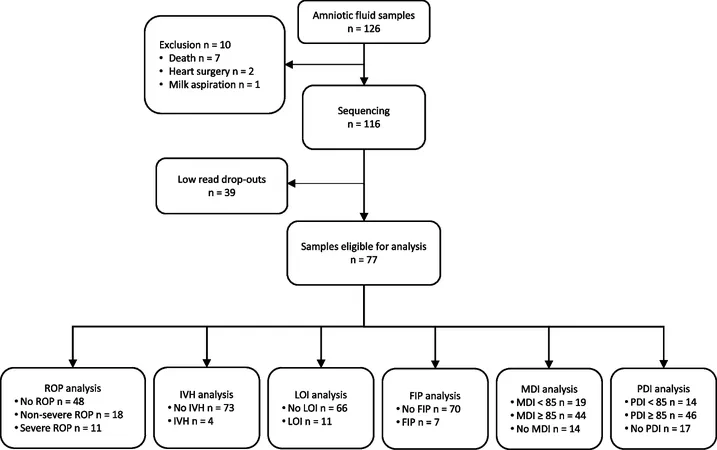
Unraveling the Microbiota Mystery: How Amniotic Fluid May Predict Outcomes for Very Preterm Infants
2025-07-18
Author: John Tan
The Surprising Role of Microbiota at Birth
Recent research has established that microbial signatures have a profound impact on both physical and mental health throughout life. Disruptions in these microbial communities, known as dysbiosis, have been linked to severe health conditions, from lung issues to neurodegenerative diseases. For newborns, abnormal microbial colonization at birth can lead to chronic ailments later on, such as asthma and autoimmune disorders.
Threats to Very Preterm Infants
Very preterm (VPT) infants face alarming health challenges in neonatal intensive care units (NICUs), including conditions like bronchopulmonary dysplasia (BPD) and intraventricular hemorrhage (IVH). Despite advancements in medical care, the burden of disease in these vulnerable infants remains high. This raises concerns about the prenatal factors that may contribute to these outcomes, such as amniotic infections.
Linking Amniotic Fluid Microbiota to Health Outcomes
In a groundbreaking prospective study, researchers explored the connection between bacterial signatures in the amniotic fluid at birth and the health outcomes of VPT infants. The analysis included 126 preterm infants, focusing on the variations in bacterial community composition and their acute and long-term effects on health.
Study Insights: Defining the Impact of Microbiota
The study revealed that specific bacterial clusters in the amniotic fluid were linked to severe health issues in infants, indicating a strong connection between prenatal microbial environments and both immediate and long-term health outcomes. For instance, the Escherichia-Shigella cluster was associated with acute severe outcomes, while Enterococcus and Ureaplasma species correlated with more favorable developmental outcomes.
Evaluating Infant Development at Two Years
Follow-up assessments conducted at two years old showcased that infants with favorable microbial signatures in their amniotic fluid displayed better cognitive and motor development. This highlights the potential for using microbial signatures as early markers for predicting health trajectories in preterm infants.
Future Directions: Expanding Research on Microbial Pathogenicity
The study calls for further investigations into the specific strains of bacteria and their pathogenicity. It emphasizes the importance of expanding research to identify which microbial compositions can lead to both acute morbidities and cognitive impairments later in life.
Conclusion: A New Frontier in Neonatal Health
As we delve deeper into the role of microbiota, it becomes evident that the microbial environment at birth is crucial for understanding and possibly mitigating risks faced by very preterm infants. This research not only opens the door to improved clinical strategies but may also reshape our understanding of prenatal health and its lasting effects on neonates.





 Brasil (PT)
Brasil (PT)
 Canada (EN)
Canada (EN)
 Chile (ES)
Chile (ES)
 Česko (CS)
Česko (CS)
 대한민국 (KO)
대한민국 (KO)
 España (ES)
España (ES)
 France (FR)
France (FR)
 Hong Kong (EN)
Hong Kong (EN)
 Italia (IT)
Italia (IT)
 日本 (JA)
日本 (JA)
 Magyarország (HU)
Magyarország (HU)
 Norge (NO)
Norge (NO)
 Polska (PL)
Polska (PL)
 Schweiz (DE)
Schweiz (DE)
 Singapore (EN)
Singapore (EN)
 Sverige (SV)
Sverige (SV)
 Suomi (FI)
Suomi (FI)
 Türkiye (TR)
Türkiye (TR)
 الإمارات العربية المتحدة (AR)
الإمارات العربية المتحدة (AR)